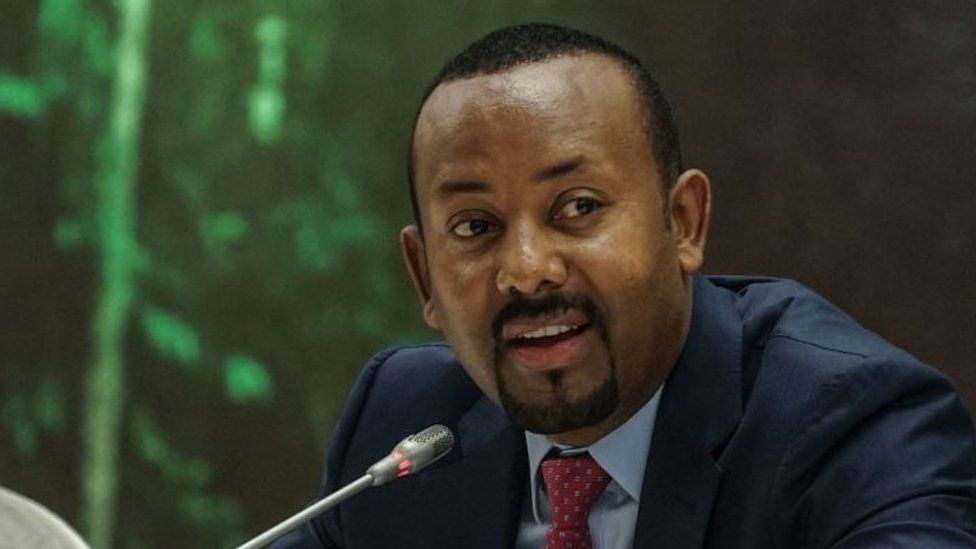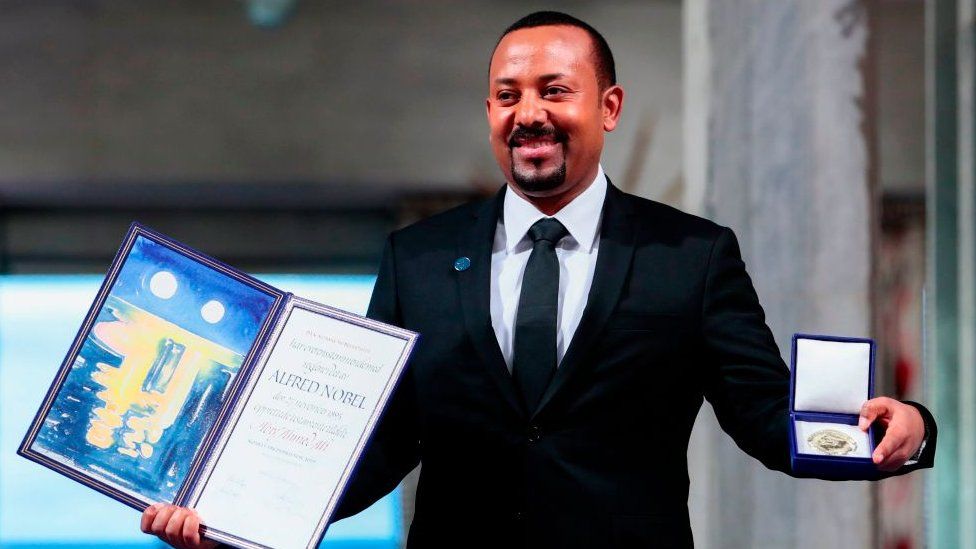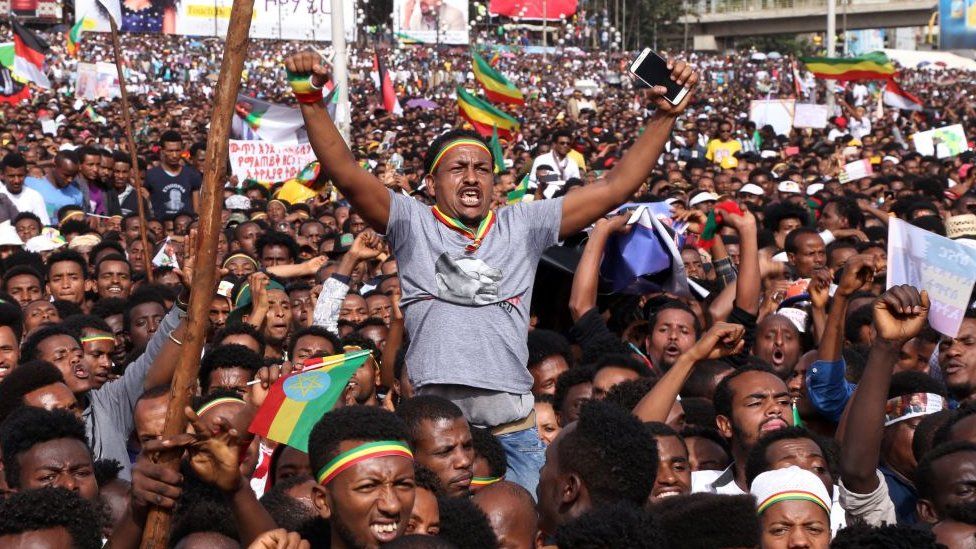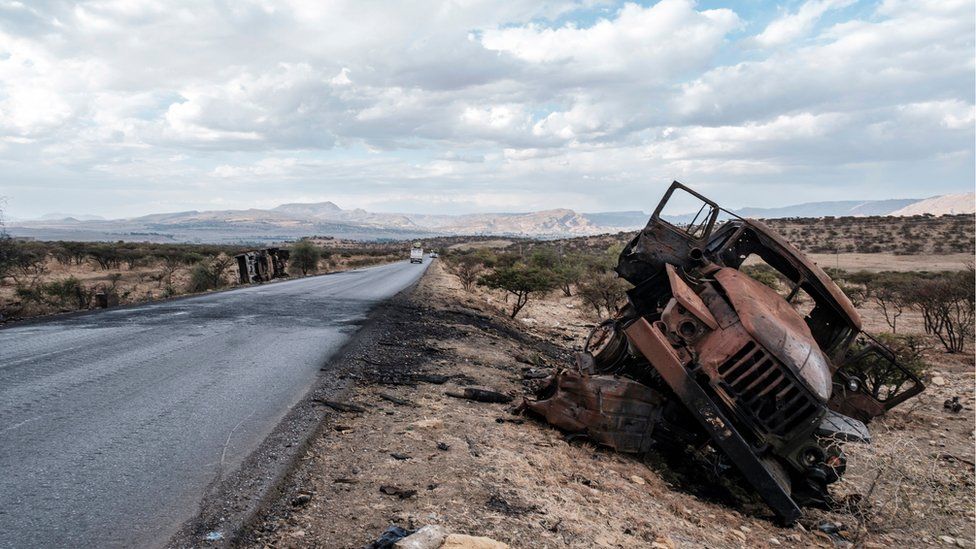By Kalkidan Yibeltal

Ethiopia’s Prime Minister Abiy Ahmed was once widely praised outside the country for his reforming zeal but that image was shattered in the months leading up to his first electoral test.
His journey from darling of the international community to condemnation has been swift.
Bagging the Nobel Peace Prize in October 2019 for finally bringing an end to the 20-year stalemate with Eritrea cemented his international status. But the war in Ethiopia’s northern Tigray region has meant a rapid reversal.
He became prime minister in 2018 at the age of 41, taking on the job against the backdrop of anti-government protests. His youthful energy and beaming smile offered hope.

Abiy Ahmed won the Noble Peace Prize in 2019 for ending hostilities with Eritrea
Mr Abiy’s governing Ethiopian People’s Democratic Front (EPRDF) coalition was deep into its third decade in power and had been dogged by accusations of repression and human rights abuses. This included the locking up of opponents and silencing of journalists.
The EPRDF had overseen speedy economic growth but many felt excluded from its benefits.
This feeling of marginalisation, particularly among the country’s largest ethnic group, the Oromo, fuelled a wave of demonstrations. Mr Abiy, an Oromo himself, was promoted to the top job and immediately set about addressing concerns in a dizzying period of reforms.
He released thousands of political prisoners, lifted restrictions on the independent media and invited the country’s once-banned opposition groups back into the country from exile.
He backed a woman to become president, created gender parity in the cabinet and established a ministry of peace.
Youthful exuberance
The crowning achieving was the peace deal with Eritrea and the reopening of the common border.
Mr Abiy toured the country and spoke about bringing the multi-ethnic country together. He devised a new political philosophy – medemer – aimed at fostering a sense of national unity in the face of ethnic divisions. He also wanted to celebrate that diversity.
He enjoyed widespread popularity, partly as a result of the dramatic changes in the country, but part of his appeal was also his personal story.

There were large rallies backing the prime minister’s reforms in 2018
Born in Beshaha, a coffee-farming district in south-western Ethiopia, from Christian and Muslim parents, he was quickly seen as someone capable of uniting an increasingly divided country.
As the country’s first ethnic Oromo leader in recent years, he had the attention of protesting youths who demanded greater political inclusion.
He travelled across the country projecting youthful exuberance. His approachability contrasted with the fear-inducing distance of his predecessors and for many ordinary citizens he met on his frequent trips, he was nothing like any recent leader they knew.
Nevertheless, he had been an insider.
He was in the military where he rose to the rank of lieutenant colonel. He was then the founder and director of the country’s Information Network and Security Agency, which was responsible for cyber-security in a country where the government had exercised tight control over the internet.
After that he became the minister for science and technology.

Key dates: Abiy Ahmed
- 1976: Born to Oromo Muslim father and Amhara Christian mother
- 1990: Joins the armed struggle against the Marxist Derg regime
- 2016: Briefly serves as minister of science and technology
- 2017: Completes doctorate in peace and security issues from Addis Ababa University
- 2018: Becomes prime minister
- 2019: Wins Nobel Peace Prize
- 2020: Conflict in Tigray begins

But once the euphoria of Mr Abiy’s early days as prime minister was gone, long-simmering tensions that had been kept under wraps during the days of authoritarian rulebegan to boil over.
His push for unity while also celebrating diversity hit problems.
Ethnic clashes and attacks on individuals because of their ethnicity have happened across the country, killing thousands. In 2019, close to two million people had fled their homes and were living elsewhere in the country.
The assassination of prominent individuals, which had been a rarity in the past, began occurring with alarming frequency.
Musician murdered
The army’s chief of staff and the leader of the country’s second largest region were killed in a single night hundreds of miles apart. Many other low- and mid-level officials met similar fates.
And to quell growing violence, Mr Abiy returned to the tactics of previous governments.
Internet and phone lines were shut down multiple times. Suspects were arrested en masse. Some were later released having spent weeks or months behind bars without a trial.
The murder a year ago of popular Oromo musician Hachalu Hundessa in the capital, Addis Ababa, further heightened ethnic tensions and led to increased security measures.
The violence that followed his killing in Oromia, the country’s largest region, and Addis Ababa claimed more than 200 civilian lives.
Prominent opposition figures were arrested on suspicion of inciting or escalating the violence. That prompted accusations against the prime minister by many Oromo activists that he was attempting to wipe out meaningful opposition in Oromia.
But it was relations with another of the country’s ethnically based states that has damned his reputation.
His move in November 2019 to disband the EPRDF and form a new unified political organisation, the Prosperity Party, intensified his struggle with the Tigray People’s Liberation Front (TPLF).
The TPLF was the ruling party in Tigray and had been the dominant force within the EPRDF government.
Sensing a reduction in its power, the TPLF refused to join Mr Abiy’s new organisation. It essentially withdrew back to its heartland and tensions finally broke out into conflict between the federal government and the TPLF.
The war, which is now in its eighth month, was described by Mr Abiy as a “law-enforcement operation”. But as it has dragged on there are growing accusations of human rights abuses, mass rape, extra-judicial killing and the use of starvation as a tactic.
The tone of the international expressions of concern has become increasingly harsh.

Tigray has been devastated by the conflict
Last month, the US, once a stalwart ally in the fight against terror, announced visa restrictions on people found “responsible for, or complicit in, undermining resolution of the crisis in Tigray”.
The US also imposed restrictions on economic and security assistance.
This is a remarkable turnaround to how Mr Abiy and his government were viewed three years ago.
But when it comes to the election, it is his reputation at home that matters most – and that has also been damaged.
Criticism is inevitable
Last year’s postponement of the poll when the coronavirus hit the country was seen by some as a power grab.
Some ethnic Oromos “who supported him or otherwise were neutral [towards him] have now turned against him”, argues Adem K Abebe, a Netherlands-based Ethiopian analyst.
While in Tigray where there were suspicions towards him even from the very beginning, “the mistrust towards him has morphed into hatred”, he adds.
And while he has enjoyed a lot of backing among ethnic Amharas, that has recently been affected by a recurrence of ethnic-based attacks against Amharas living in Oromia and Benishangul-Gumuz regions.
Despite this, Mr Abiy’s party is the favourite to win as key opponents are either imprisoned or boycotting the poll.
The shifts in attitudes towards the prime minister are “partly a result of the unrealistic expectations and personality cult that Mr Abiy sought to build”, Mr Adem told the BBC.
He promised “peace, democracy and prosperity while facing mistrust among significant portions of the population and now among key Western allies”.
But it is not clear how much this bothers Mr Abiy.
While he shuns interviews with reporters, he nonetheless enjoys the spotlight.
A common theme in his numerous speeches and social media posts is how Ethiopia will prevail despite significant challenges.
It appears that he sees criticism of his government as an inevitable by-product of attempting to bring change.
Source: BBC

Leave a Reply